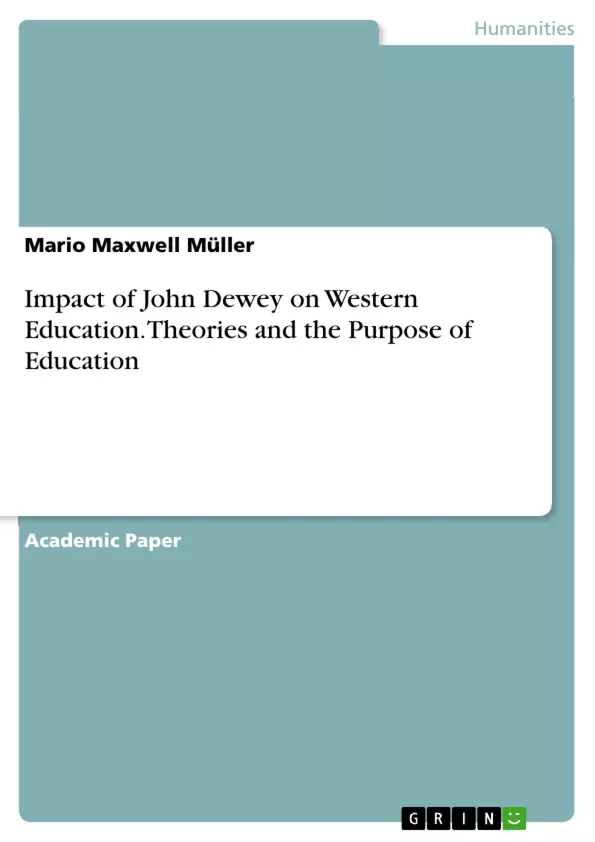This research paper will discuss the purpose of education focusing on Dewey's theories and the impact of Western Education with an emphasis on the use of the International Baccalaureate Programme and its relevance in the context of curriculum development. There are several factors influencing education by looking at the history of education and the nature of supplying social efficiency, and cultural aim. Dewey´s Philosophy of education was discussed with the purpose of education and experiences, the teacher and child, and how these principles align with the ideology of an IB education. The conclusion highlights that a connection exists between the various IB profiles focussing on the students being risk-takers, open-minded, principled, reflective, thinkers, inquirers and balanced and the educational philosophy of Dewey.
Table of Contents
- Introduction
- History of Education
- Nature as Supplying Aim
- Social Efficiency as Aim
- Culture as Aim
- Dewey's Philosophy of Education
Objectives and Key Themes
This research paper explores the purpose of education, focusing on the theories of John Dewey and their impact on Western education. The paper examines the relevance of the International Baccalaureate (IB) Programme in the context of curriculum development.
- The history of education and its various aims, including nature, social efficiency, and culture.
- Dewey's philosophy of education, emphasizing experience, the teacher-student relationship, and the alignment with IB principles.
- The impact of Dewey's theories on Western education, particularly the IB Programme.
- The importance of cultural diversity and inclusion in education.
- The role of education in promoting social reform and democratic values.
Chapter Summaries
- Introduction: This chapter introduces the topic of the purpose of education and the significance of Dewey's theories. It also explores the relevance of the IB Programme in the context of curriculum development.
- History of Education: This chapter provides a historical overview of different educational philosophies, focusing on the contributions of Dewey. It examines three main ideologies related to Dewey: nature as supplying the aim, social efficiency as aim, and culture as aim. It analyzes the strengths and limitations of each ideology and how Dewey addressed them in his work.
- Dewey's Philosophy of Education: This chapter delves into Dewey's philosophy of education, highlighting his focus on experience, the role of the teacher, and the relationship between education and social reform. It explores how Dewey's principles align with the ideologies of an IB education.
Keywords
Key terms and concepts explored in this paper include Dewey's theory, education, International Baccalaureate Programme, democratic education, social efficiency, cultural aims, experience, teacher-student relationship, curriculum development, and social reform.
Frequently Asked Questions
What is John Dewey's main philosophy regarding education?
Dewey believed that education is a social process and that learning occurs best through experience and active inquiry rather than passive memorization.
How do Dewey's theories relate to the International Baccalaureate (IB) Programme?
Dewey’s principles of inquiry-based learning and developing reflective, open-minded students align closely with the IB learner profile and its focus on holistic development.
What are the three main aims of education discussed in Dewey's history?
The research highlights education as a means for supplying nature's aim, social efficiency, and cultural aims within society.
What role does the teacher play in Dewey's educational model?
In Dewey's model, the teacher acts more as a facilitator or guide who structures learning experiences rather than just an authoritative source of information.
How does Dewey view the relationship between education and democracy?
Dewey saw education as a vital tool for social reform and the promotion of democratic values, preparing students to be active participants in a diverse society.
- Quote paper
- PhD Candidate - Music Education - Doctoral studies Mario Maxwell Müller (Author), 2022, Impact of John Dewey on Western Education. Theories and the Purpose of Education, Munich, GRIN Verlag, https://www.grin.com/document/1240282



